The professor is an ordinary man - or even woman!
Meet the professor: 24 Faculty of Science professors visit primary schools
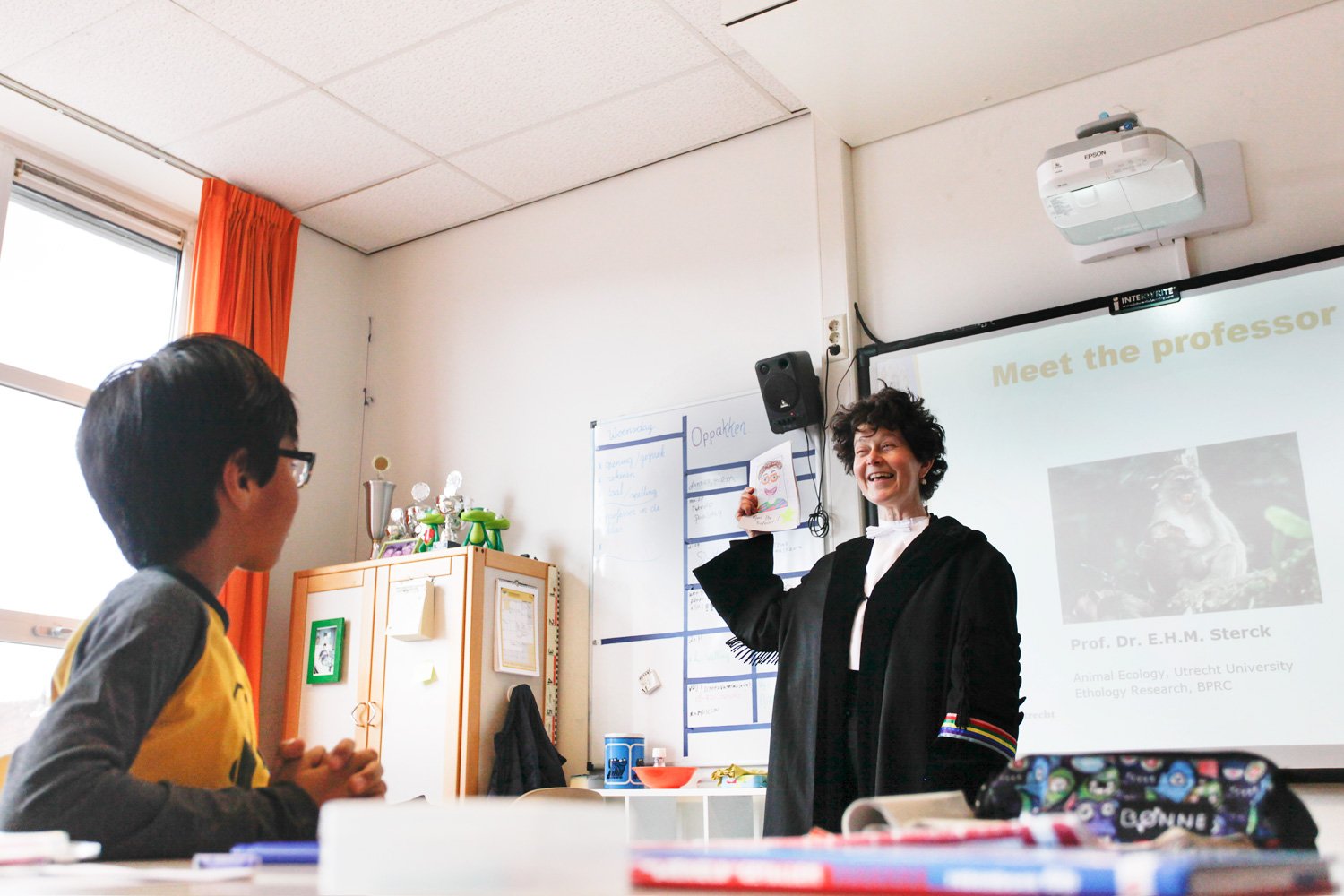
On 30 March, a total of 24 professors from the Faculty of Science rode their bicycles to primary schools in Utrecht to give a guest lecture. Both the pupils and the professors were enthusiastic about the visits afterwards, and the event also generated quite a bit of publicity. Prof. Roos Masereeuw (Pharmaceutical Sciences) was even featured on the NOS Journaal, the Jeugdjournaal and RTV Utrecht.
Prof. Kobus Kuipers (Physics and Astronomy/AMOLF), thought it was a fantastic initiative. “The great thing was it allowed us to reach children whose parents wouldn’t normally take them to a Science Museum or to Science in the City.” After the lesson, a teacher told Prof. Liesbeth Sterck (Biology) that the children were astonished that the professor was a woman. “That was perhaps the biggest eye-opener for them.”
Image of professors
Before the lesson, the students of each class drew a picture of a professor. “What we noticed was that the majority had drawn a man with glasses and unkempt hair”, Kuipers explains. “I asked the class how they came up with that image. Apparently, it comes from films and television, where professors are always depicted that way.”
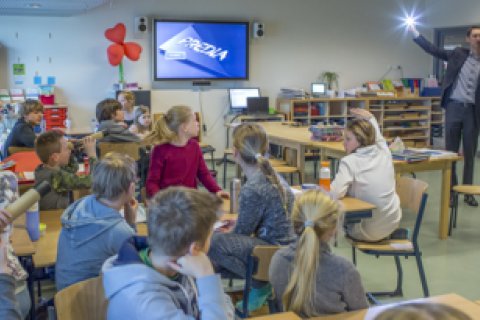
Computer games
The pupils were also surprised to learn that Kuipers once wanted to become a baker when he grew up, then a veterinarian or attorney, and only realized that he wanted to be a physicist much later in life. “They were surprised to find out that a really smart man is also an ordinary guy who likes to play computer games just like they do”, added teacher Pelle van den Berg.
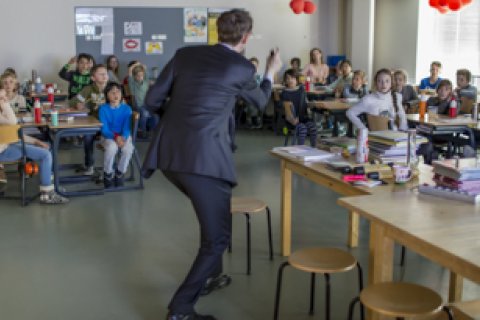
Questions
Van den Berg told how Kuipers was able to hold the attention of 45 children from groups 6, 7 and 8 at the Arcade school in Leidsche Rijn for more than an hour. Kuipers had not drawn up a detailed lesson plan in advance. “I mainly tried to get the children to ask questions about what they thought they knew about light. Can you see light? Can you store it? Can you send it from point A to point B? For example, they had no idea that all of the app messages they send are actually light sent via a fibre-optic cable.”
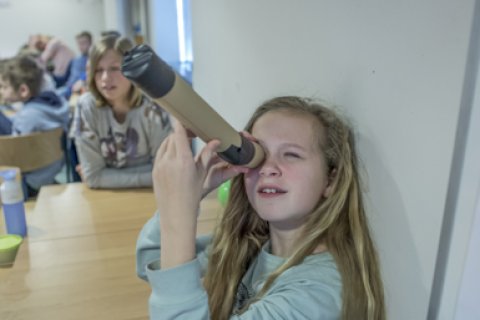
Smartest question
The smartest question came from a girl who was looking through the other side of a spectroscope and asked why she saw the colour blue. “I didn’t have an answer right there and then, but I told her that I thought it was fantastic that she asked that question, because that’s what it means to be a researcher. Trying things out for yourself and asking yourself questions. The girl started to blush, so I was worried that it might not have been a good reply, but later the teacher told me that she was blushing from pride.”
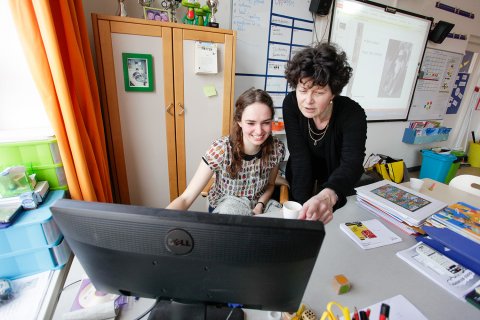
Preparation
Sterck prepared for her visit to group 6 at the St. Dominicus School in Oog in Al together with ALPO student Nina van Stokkum. ALPO is the academic primary education teacher training programme, a combination of the Education Bachelor’s programme at Utrecht University and the primary education study programme at Utrecht University of Applied Sciences. Sterck found their cooperation to be very useful. “I might have told my story differently, but Nina advised me to give the children something to do too. That worked extremely well.”
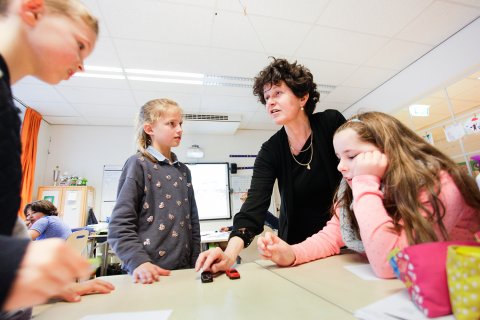
Role play
The children did a role-playing game to learn how apes can be taught to do something specific, where one student was the researcher and the other was the ape. The researcher had to train the ‘ape’ to perform a specific task with two toy cars, such as putting one car on top of the other. If the ‘ape’ did what he or she was told, then the ‘ape’ received a reward. “That allowed the children to experience what it’s like to have to teach an ‘ape’ something without spoken instructions, and how difficult it is for a researcher to get an ape to do what you want it to do”, explains Van Stokkum.
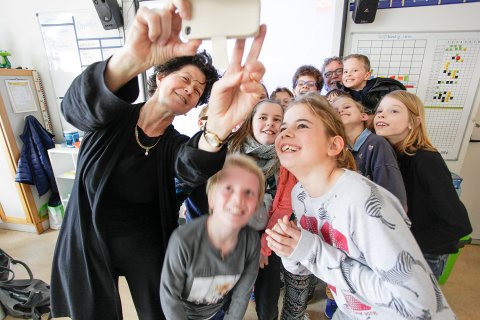
Laboratory
According to Van Stokkum, the children paid close attention to the lesson and participated enthusiastically in the role-play game. They also had so many questions that Sterck could not answer them all. For example, they wanted to know how you can become a professor. They also thought that a professor always works in a laboratory. After Sterck’s lesson, several children said that they thought it would be fun to become a professor themselves.

